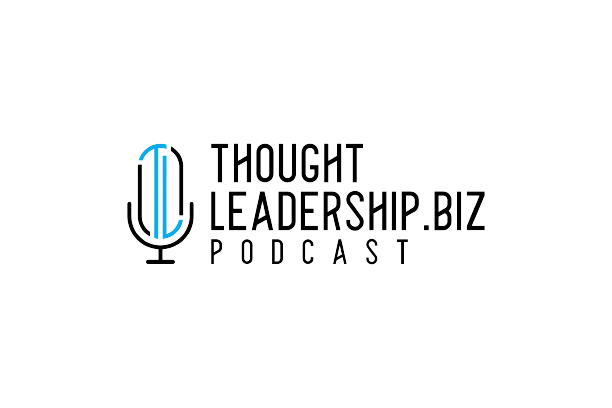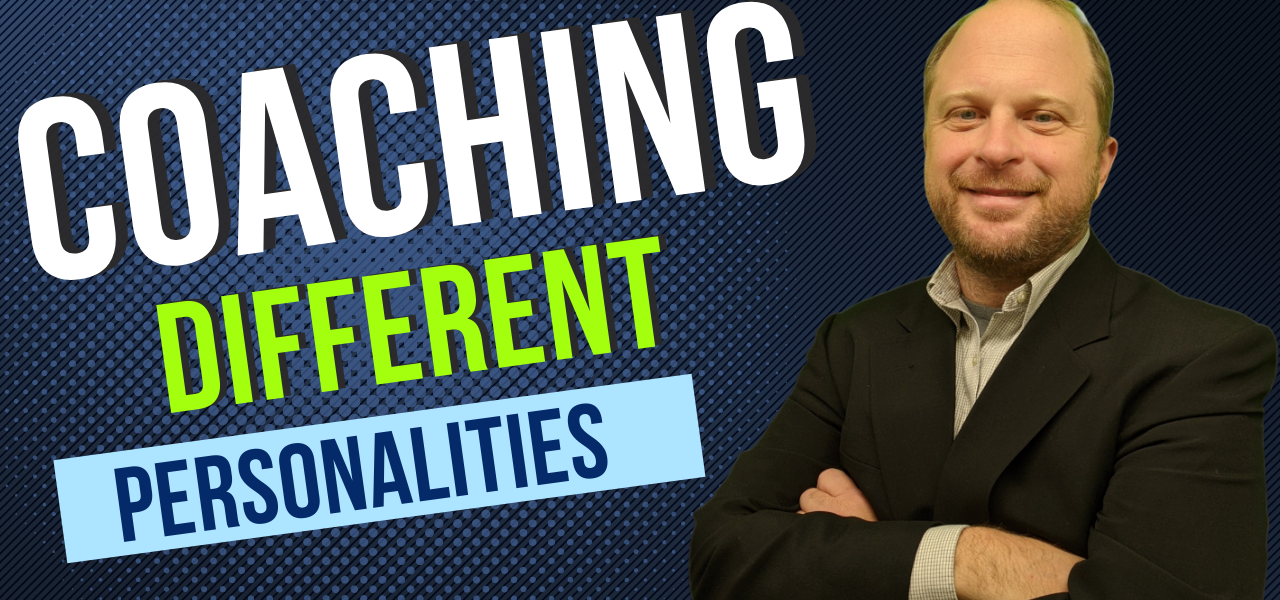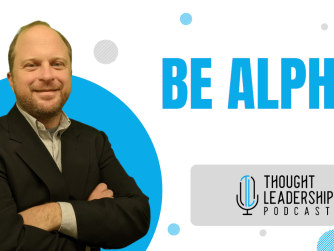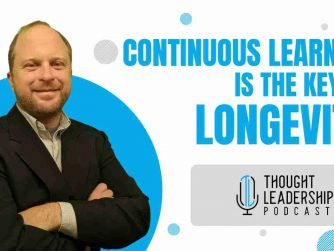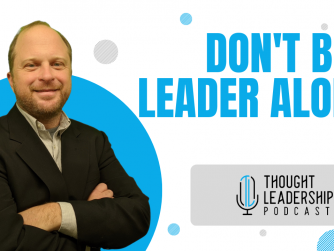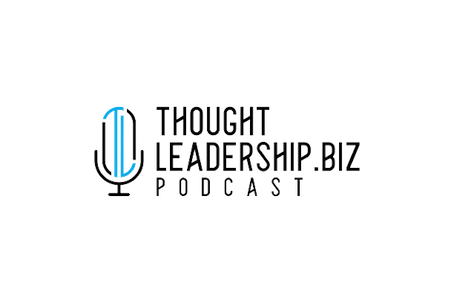
Read / Watch / Listen
Stream this article from your favorite podcast audio or video streaming service as referenced below.
Read: Below
Watch: https://youtu.be/KBfMPcJcbTg
Listen: https://anchor.fm/thoughtleadershipbiz
More ways to read, watch and listen:
Read the Article
Hi everyone, and welcome to another spectacular episode of ThoughtLeadership.biz.
I’m Chris Machut and in today’s programme we’ll be taking a deep dive into the depths of the human psyche and exploring the art of coaching different personalities.
So, hold on to your entrepreneurial hats ladies and gents – you might just discover a few new things about yourself. . .
*****
In business, as in life, you’re gonna meet a whole range of different people.
Some you’ll like, some you’ll dislike and some you’ll downright hate. But unlike life, in business you’ve gotta make it work, especially when you’re leading and coaching employees in your own organization.
As the saying goes, ‘variety is the spice of life’ – and that’s not wrong. In the 21st Century we need to encourage ourselves and others to embrace diversity and rise to the challenge of engaging, leading and coaching challenging people. But it ain’t always easy.
After all, anyone who has eaten Mexican food knows a little spice is nice, but too much and it starts to burn baby. . .
The fact of the matter is, some people are difficult to work with and difficult to get through to – but understanding how to do that is all par for the course for any serious entrepreneur.
So, as leaders and coaches, in order to coach – and not just manage – different people effectively, we need to find out what ingredients make them who they are. And we need to take a good look at ourselves, too.
Only when we understand the different personalities we are working with can we select the best ways of not just dealing with them, but getting the most out of them.
*****
Before we get into it, I’ll remind you, as usual, to check out all my newest articles, podcasts and more at ThoughtLeadership.biz. You can catch me in person on YouTube, listen to me waxing lyrical via Spotify and Anchor.fm, or tune into Apple and Google Podcasts.
If you’re a glutton for professional punishment and still want more, get yourself over to Twitter and LinkedIn, where you can subscribe for regular leadership updates!
*****
Alright, so let’s get to it.
If, twenty years ago, you told someone you were professionally coaching your colleagues at work, they’d probably wonder how you managed to persuade your employees to join a sports team and where you’d been hiding your own sporting skills for all this time.
But times have changed and now ‘coaching’ is not only one of the hottest buzzwords, it’s one of the most important business tools. And there’s a good reason for it.
The modern workplace is more complex, fluid and demanding than ever and enabling people to work cohesively together is more important than it’s ever been before. That’s why these days a good EQ (the Emotional Quotient) as well as a good IQ (the Intellectual Quotient) is in such high demand.
And that goes for managers and leaders, like you and me, as well as employees ‘on the shop floor’. After all, how can you effectively coach someone, if you can’t even coach yourself?
*****
The first step to successfully coaching your team is recognising the personality types in your organization. But where do you start?
Well, how about starting with yourself? Because the secret to coaching success is first understanding your own EQ.
Once you’ve done that, you can understand how to harness your potential to then help others through coaching strategies that work for both coach and coachee (and yep, that is a word, apparently).
How to identify your own personality type
Al of us fall somewhere on the spectrum of extroverted and introverted. Me? I’m an extrovert most of the time. But that doesn’t tell me much about how effective I’ll be as a coach.
To do that, we need to break it down a little further.
The coaching literature defines people as generally either outgoing or reserved, task-oriented or people-focussed, so you need to decide where you fall between each of these points on the scale.
The popular DISC model, created by Harvard psychologist William Moulton Marston, breaks things down even further by describing personality as a mixture of the following four ingredients: Dominant & Driven; Influencing & Persuading; Secure & Steady; and Compliant & Considered.
The amount of each of these ingredients baked into your ‘personality cake’ – that’s not an official academic term by the way, just in case you wondered – determines how effectively you can manage different coachee personality types.
Let’s have a quick look at each one.
D Personality Type: Dominant and Driven
If you’re this type of person, you’re results-driven and solution-oriented with a low patience threshold and a penchant for getting easily frustrated, especially when others move more slowly than you. You’re probably not going to be the most natural coach ever. . .
I Personality Type: Influencing & Persuading
You’re wired for helping people and like to inspire others, so you love helping people improve. However, as you’re so outgoing, you’ll need to ensure that you remain objective and listen empathetically to the other person rather than tell them what you think they want to hear. As a ‘people-person’, you’re likely to be an effective coach, as long as you remain objective and say what needs to be said rather than what you think the coachee wants to hear.
S Personality Type: Secure & Steady
If you’re secure and steady, you like to offer support and make sure that everything is stable – but that comes with a downside. Because you value the status quo, you might not be prepared to challenge the coachee – or yourself – fully.
C Personality Type: Compliant & Considered
This type of personality is happy to follow the rules. They’re likely to be extremely effective at getting things done, but not necessarily at getting things moving. Coaches need to be willing to step outside their own comfort zone and adapt and pivot along the way, as they will be asking their coaches to do the same. These guys might find that difficult. Or perhaps even impossible.
So, there you have it.
Whoever you are, you’re going to be a mixture of one or two, or perhaps more, of these four personality types. And so is the coachee.
Understanding your coachee
The coachee obviously shares a combination of those four personality types, too.
- Dominant & Driven types will be on point and punctual, reliable and committed. But they’ll want measurable results and want them fast. If you’re not careful, they might end up managing and coaching you rather than the other way round.
- Influencing & Persuading types will be more than happy to chat; they love nothing more than an in-depth conversation about something meaningful – but you’ll need to keep things firmly on track. These types are likely to wander off and lack focus unless things are laid out clearly for them and the focus maintained.
- Secure & Steady types will value the framework, work with you and ask lots of good questions. They’ll be prepared to wait for results but might not like to be challenged or see you veer off into what they perceive as unorthodox approaches to coaching. In general, they’re conservative, so use that to your advantage.
- Lastly, the Compliant & Considered type. These individuals will take things very seriously and are likely to be very well prepared, so you’ll need to make sure that you are too! Be aware that some people who fall into this category are perfectionists. They’re also likely to be highly analytical and might ask some precise and challenging questions regarding the process and outcomes. Basically, when you;re coaching these guys, you’ll need to be on your toes. . .
*****
Now you know. . .
Now you know more about the different personality types and about where you fit in amongst them, it’s time to sit down and reflect on how you think you can best approach coaching each member of your team.
Unless you’re working with a team full of schizophrenics or people who suffer from multiple personality disorders, you can find ways to not only communicate effectively but make a huge difference in their lives and the future of your company.
And if you do realize your team has some serious clinical personality problems, forget about the coaching and take a long, hard look at your vetting process. . .
Calibrating your coaching approach for success isn’t that hard once you understand the basics. It doesn’t take a rocket scientist (or brain surgeon) to figure out that getting a group of Dominant and Driven types together for a group session is likely to end in an argument – or worse – and being too direct with a Compliant & Considerate type might make them feel upset and undervalued.
I could go on with the examples, but I’m sure you get the picture. . .
At the end of the day, coaching different personality types in business is similar to getting along well with people in the outside world. The only major difference is that as entrepreneurs, as owners of the organizations we lead and manage, the buck literally stops with us.
Failing to coach effectively doesn’t just mean we lose a friend; it means we potentially lose our entire livelihood and everything we’ve worked so hard for. . .
Learning to flex our leadership style and coaching approach by adapting to the needs of our teams is one way to help ensure that our ship doesn’t go under. It’s also a way to ensure that our teams grow stronger, more united and more effective than ever.
When we view it like that, we can understand why learning to coach well is one of the best things we can invest our time in.
And that’s exactly why I decided to talk about it today.
Best of luck with your coaching journey – let me know how it goes. . .
*****
This is Chris Machut.
See you next time – and stay safe out there!
Latest posts by ThoughtLeadership (see all)
- Episode 24 – The Crypto Cake CEX vs DEX - January 27, 2023
- Episode 23 – Blockchain Basics - December 16, 2022
- Episode 22 – Be Alpha - November 18, 2022


